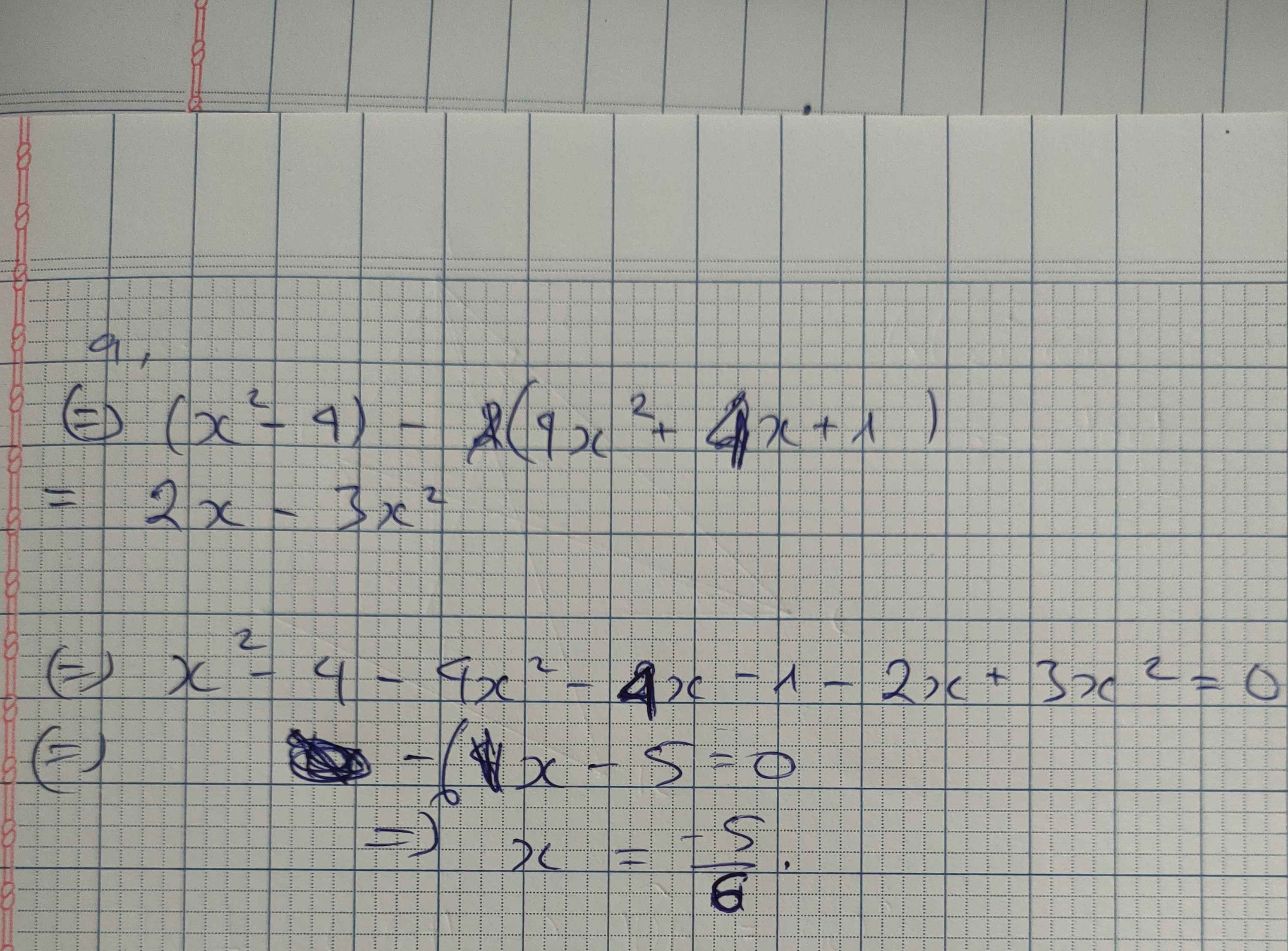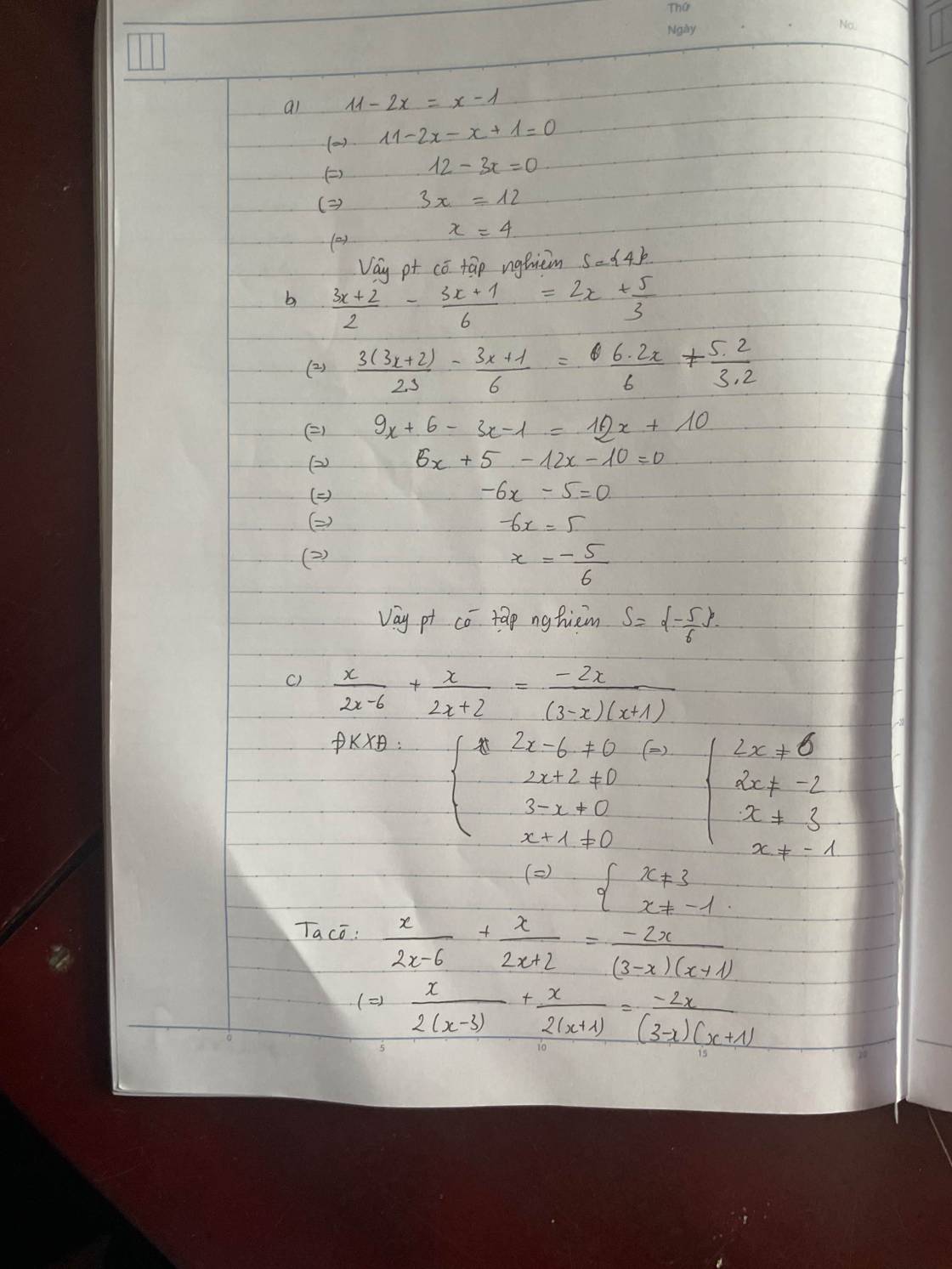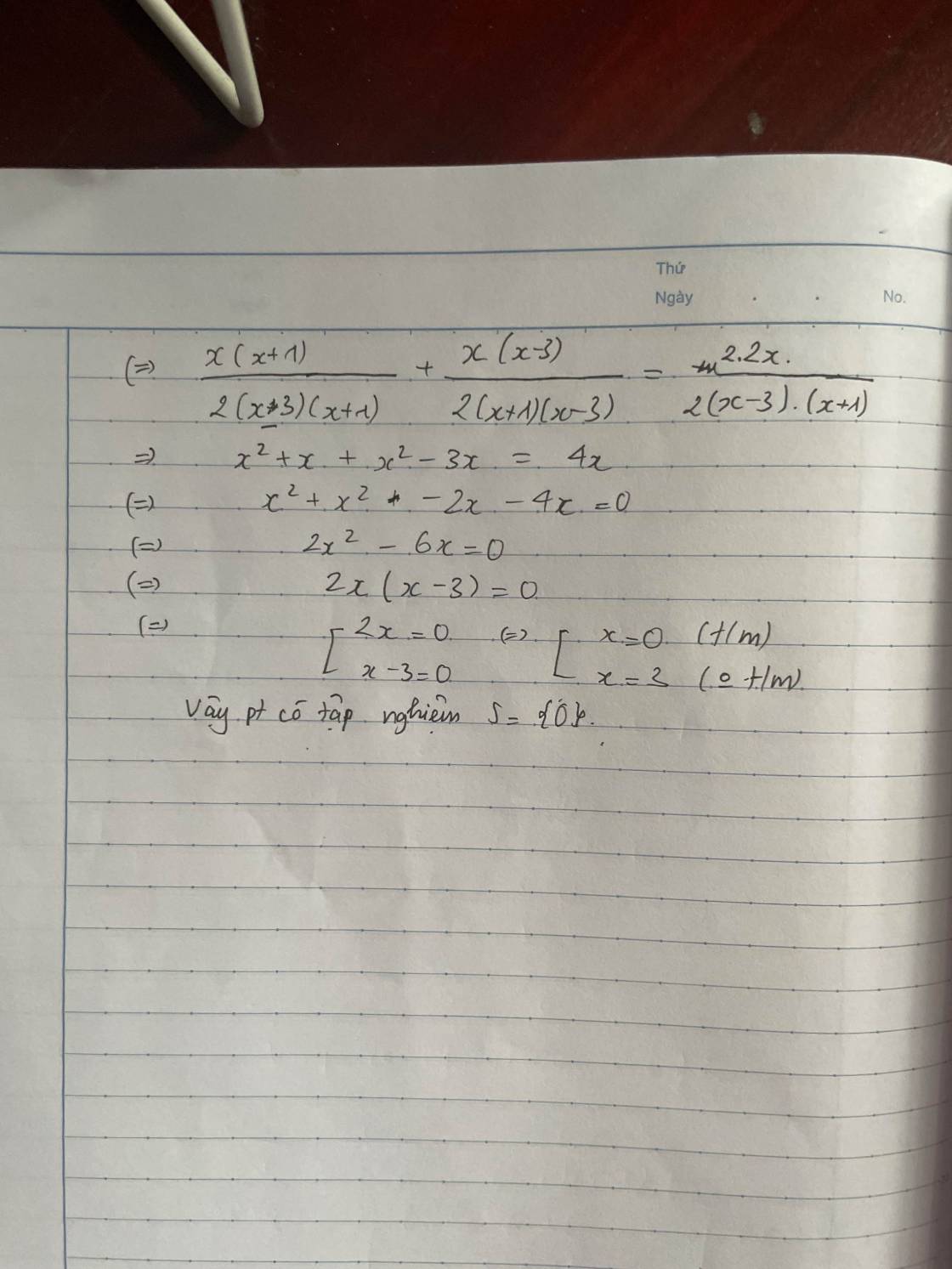Hãy nhập câu hỏi của bạn vào đây, nếu là tài khoản VIP, bạn sẽ được ưu tiên trả lời.

Bài 1:
\(a,3\left(x-11\right)-2\left(x+11\right)=2011\)
\(\Leftrightarrow3x-33-2x-22=2011\)
\(\Leftrightarrow x-55=2011\)
\(\Leftrightarrow x=2066\)
Vậy pt có nghiệm x = 2066
\(b,\left(x-1\right)\left(3x-7\right)=\left(x-1\right)\left(x+30\right)\)
\(\Leftrightarrow\left(x-1\right)\left(3x-7\right)-\left(x-1\right)\left(x+30\right)=0\)
\(\Leftrightarrow\left(x-1\right)\left(3x-7-x-30\right)=0\)
\(\Leftrightarrow\left(x-1\right)\left(2x-37\right)=0\)
\(\Leftrightarrow\left[{}\begin{matrix}x-1=0\\2x-37=0\end{matrix}\right.\Leftrightarrow\left[{}\begin{matrix}x=1\\x=\dfrac{37}{2}\end{matrix}\right.\)
Vậy pt có tập nghiệm \(S=\left\{1;\dfrac{37}{2}\right\}\)
\(c,\dfrac{x+2}{x-2}-\dfrac{1}{x}=\dfrac{2}{x^2-2x}\) (1)
ĐKXĐ : \(\left\{{}\begin{matrix}x\ne0\\x\ne2\end{matrix}\right.\)
\(\left(1\right)\Leftrightarrow\dfrac{x\left(x+2\right)}{x\left(x-2\right)}-\dfrac{x-2}{x\left(x-2\right)}=\dfrac{2}{x\left(x-2\right)}\)
\(\Rightarrow x^2+2x-x+2-2=0\)
\(\Leftrightarrow x^2+x=0\)
\(\Leftrightarrow x\left(x+1\right)=0\)
\(\Leftrightarrow\left[{}\begin{matrix}x=0\\x=-1\end{matrix}\right.\)
Vậy pt có tập nghiệm \(S=\left\{0;-1\right\}\)
\(d,\left|2x-3\right|=x+1\)
\(\Leftrightarrow\left[{}\begin{matrix}2x-3=x+1\\2x-3=-x-1\end{matrix}\right.\)
\(\Leftrightarrow\left[{}\begin{matrix}2x-x=1+3\\2x+x=-1+3\end{matrix}\right.\)
\(\Leftrightarrow\left[{}\begin{matrix}x=4\\3x=2\end{matrix}\right.\Leftrightarrow\left[{}\begin{matrix}x=4\\x=\dfrac{2}{3}\end{matrix}\right.\)
Vậy pt có tập nghiệm \(S=\left\{4;\dfrac{2}{3}\right\}\)
Bài 2:
\(a,2\left(x-1\right)< x+1\)
\(\Leftrightarrow2x-2< x+1\)
\(\Leftrightarrow2x-x< 1+2\)
\(\Leftrightarrow x< 3\)
Vậy bpt có nghiệm x < 3
b, Đề bài ko rõ
x-\(\dfrac{x+2}{3}\)nhỏ hơn hoặc bằng 3x+\(\dfrac{x}{2}+5\)

a: \(\Leftrightarrow x^2-4-4x^2-4x-1-2x+3x^2=0\)
=>-6x-5=0
=>-6x=5
hay x=-5/6
b: \(\Leftrightarrow2x^3+8x^2+8x-8x^2-2x^3+16=0\)
=>8x+16=0
hay x=-2
c: \(\Leftrightarrow x^3-6x^2+12x-8+9x^2-1-x^3-3x^2-3x-1=0\)
=>9x-10=0
hay x=10/9
d: \(\Leftrightarrow10x-15-20x+28=19-2x^2-4x-2\)
\(\Leftrightarrow-10x+13+2x^2+4x-17=0\)
\(\Leftrightarrow2x^2-6x-4=0\)
\(\Leftrightarrow x^2-3x-2=0\)
\(\text{Δ}=\left(-3\right)^2-4\cdot1\cdot\left(-2\right)=9+8=17>0\)
Do đó: Phương trình có hai nghiệm phân biệt là:
\(\left\{{}\begin{matrix}x_1=\dfrac{3-\sqrt{17}}{2}\\x_2=\dfrac{3+\sqrt{17}}{2}\end{matrix}\right.\)

b: \(\Leftrightarrow\dfrac{-3x^2+36x+12}{3\left(x+4\right)\left(x-1\right)}=\dfrac{36\left(x-1\right)}{3\left(x+4\right)\left(x-1\right)}+\dfrac{12\left(x+4\right)}{3\left(x-1\right)\left(x+4\right)}\)
\(\Leftrightarrow-3x^2+36x+12=36x-36+12x+48\)
\(\Leftrightarrow-3x^2+36x+12-48x-12=0\)
\(\Leftrightarrow3x\left(x+4\right)=0\)
=>x=0(nhận) hoặc x=-4(loại)

a) \(2\chi-3=3\left(\chi+1\right)\)
\(\Leftrightarrow2\chi-3=3\chi+3\)
\(\Leftrightarrow2\chi-3\chi=3+3\)
\(\Leftrightarrow\chi=-6\)
Vậy phương trình có tập nghiệm S= \(\left\{-6\right\}\)
\(3\chi-3=2\left(\chi+1\right)\)
\(\Leftrightarrow3\chi-3=2\chi+2\)
\(\Leftrightarrow3\chi-2\chi=2+3\)
\(\Leftrightarrow\chi=5\)
Vậy phương trình có tập nghiệm S= \(\left\{5\right\}\)
b) \(\left(3\chi+2\right)\left(4\chi-5\right)=0\)
\(\Leftrightarrow\left[{}\begin{matrix}3\chi+2=0\\4\chi-5=0\end{matrix}\right.\)
\(\Leftrightarrow\left[{}\begin{matrix}3\chi=-2\\4\chi=5\end{matrix}\right.\)
\(\Leftrightarrow\left[{}\begin{matrix}\chi=\dfrac{-2}{3}\\\chi=\dfrac{5}{4}\end{matrix}\right.\)
Vậy phương trình có tập nghiệm S= \(\left\{\dfrac{-2}{3};\dfrac{5}{4}\right\}\)
\(\left(3\chi+5\right)\left(4\chi-2\right)=0\)
\(\Leftrightarrow\left[{}\begin{matrix}3\chi+5=0\\4\chi-2=0\end{matrix}\right.\)
\(\Leftrightarrow\left[{}\begin{matrix}3\chi=-5\\4\chi=2\end{matrix}\right.\)
\(\Leftrightarrow\left[{}\begin{matrix}\chi=\dfrac{-5}{3}\\\chi=\dfrac{1}{2}\end{matrix}\right.\)
Vậy phương trình có tập nghiệm S= \(\left\{\dfrac{-5}{3};\dfrac{1}{2}\right\}\)
c) \(\left|\chi-7\right|=2\chi+3\)
Trường hợp 1:
Nếu \(\chi-7\ge0\Leftrightarrow\chi\ge7\)
Khi đó:\(\left|\chi-7\right|=2\chi+3\)
\(\Leftrightarrow\chi-7=2\chi+3\)
\(\Leftrightarrow\chi-2\chi=3+7\)
\(\Leftrightarrow\chi=-10\) (KTMĐK)
Trường hợp 2:
Nếu \(\chi-7\le0\Leftrightarrow\chi\le7\)
Khi đó: \(\left|\chi-7\right|=2\chi+3\)
\(\Leftrightarrow-\chi+7=2\chi+3\)
\(\Leftrightarrow-\chi-2\chi=3-7\)
\(\Leftrightarrow-3\chi=-4\)
\(\Leftrightarrow\chi=\dfrac{4}{3}\)(TMĐK)
Vậy phương trình có tập nghiệm S=\(\left\{\dfrac{4}{3}\right\}\)
\(\left|\chi-4\right|=5-3\chi\)
Trường hợp 1:
Nếu \(\chi-4\ge0\Leftrightarrow\chi\ge4\)
Khi đó: \(\left|\chi-4\right|=5-3\chi\)
\(\Leftrightarrow\chi-4=5-3\chi\)
\(\Leftrightarrow\chi+3\chi=5+4\)
\(\Leftrightarrow4\chi=9\)
\(\Leftrightarrow\chi=\dfrac{9}{4}\)(KTMĐK)
Trường hợp 2: Nếu \(\chi-4\le0\Leftrightarrow\chi\le4\)
Khi đó: \(\left|\chi-4\right|=5-3\chi\)
\(\Leftrightarrow-\chi+4=5-3\chi\)
\(\Leftrightarrow-\chi+3\chi=5-4\)
\(\Leftrightarrow2\chi=1\)
\(\Leftrightarrow\chi=\dfrac{1}{2}\)(TMĐK)
Vậy phương trình có tập nghiệm S=\(\left\{\dfrac{1}{2}\right\}\)

b: =>1/4x+4/5-x-5=1/3x+1-1/2x+1
=>-3/4x+1/6x=2+5-4/5=24/5
=>x=-288/35
c: =>6x^2+3x-30x-15=6x^2+10x-21x-35
=>-27x-15=-11x-35
=>-16x=-20
=>x=5/4

a: =>-3x=-12
=>x=4
b: =>3(3x+2)-3x-1=12x+10
=>9x+6-3x-1=12x+10
=>12x+10=6x+5
=>6x=-5
=>x=-5/6
c: =>x(x+1)+x(x-3)=4x
=>x^2+x+x^2-3x-4x=0
=>2x^2-6x=0
=>2x(x-3)=0
=>x=3(loại) hoặc x=0(nhận)


